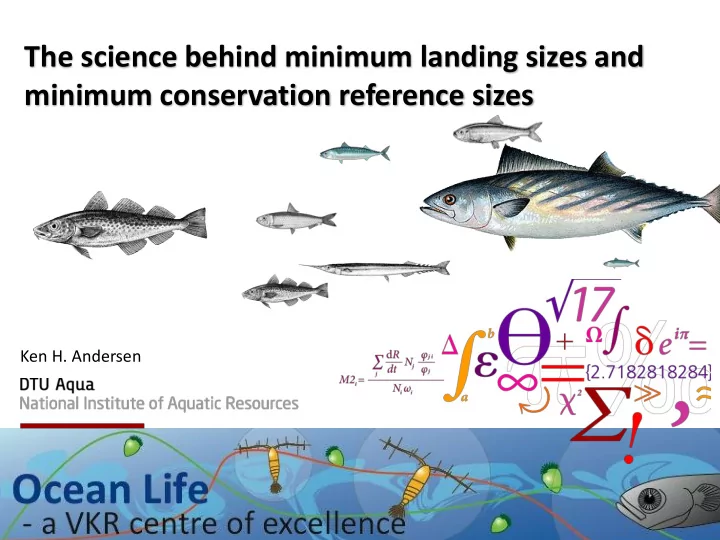

The science behind minimum landing sizes and minimum conservation reference sizes Ken H. Andersen
How?
Single species perspective … Abundance R log( w ) w0 W R p BH Recruitment
Single-species simulation http://stockassessment.org/spectrum Fishing mortality Biomass
Maximum sustainable yield Fishing mortality size at maturation Length at 50% retainment “mesh size”
Differences between stocks
W∞ weight age Why? size at maturation Mortality weight
Controversy Science, 2012
Optimal yield Fisheries yield 1 Fishing mortality (yr -1 ) 0.8 0.6 0.4 Low stock size 0.2 0 High stock size 0 1 2 3 10 10 10 10 Mesh size (g) Catch small fish Catch largefish 1 Fishing mortality (yr -1 ) 0.8 0.6 0.4 Beverton-Holt standard theory 0.2 0 0 1 2 3 10 10 10 10 Mesh size (g)
Yield 1 Fishing mortality (yr -1 ) Density dependent growth 0.8 0.6 0.4 0.2 0 0 1 2 3 10 10 10 10 Mesh size (g) ? 1 Fishing mortality (yr -1 ) 0.8 Classic Beverton-Holt theory 0.6 Early life density dependent control 0.4 0.2 0 0 1 2 3 10 10 10 10 Mesh size (g)
Beyond state of the art 1.0 Relative highest yield 0.9 0.8 0.7 0.6 0.5 6 9 12 1.0 Relative highest yield 0.9 0.8 0.7 0.6 0.5 20 30 40 1.0 Relative highest yield 0.9 0.8 0.7 0.6 0.5 By: Rob van Gemert 20 30 40 50 Fishery size − at − entry (cm)
Fisheries reference points Yield 𝑋 ∞ = 333 g Biomass Fishing mortality 𝑋 ∞ = 10 g 𝑋 ∞ = 10 kg
How do we characterize fish? Size
Single species perspective … Abundance R log( w ) w0 W R p BH Recruitment
Single-species simulation http://stockassessment.org/spectrum Fishing mortality Biomass
Fisheries reference points 0.75 0.50 F MSY Fishing mortality 0.25 Fcrash Flim 0.00 10 100 1000 10000 1e+05 W ¥ “Metabolic” scaling, F msy W -1/4 Fmsy Asymptotic weight (g) Andersen and Beyer (2015) F&F
Recommend
More recommend